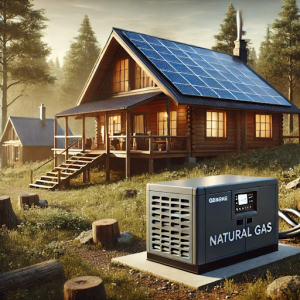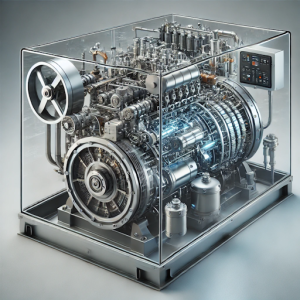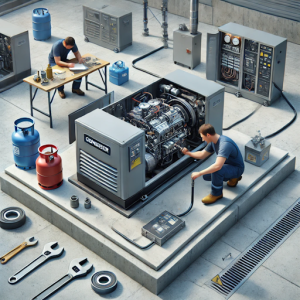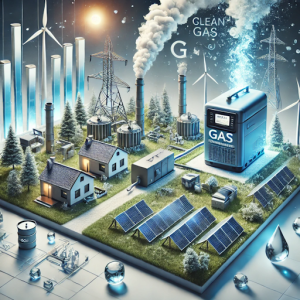Discover the Transformative Advantages of Natural Gas Generators for Off-Grid Living
Natural gas generators are an exceptional choice for individuals looking for a dependable power solution for their homes or remote cabins. Grasping the various methods of power generation is essential for embarking on a successful off-grid lifestyle. The unique benefits of natural gas generators—including their reliability, cost-effectiveness, and environmentally friendly attributes—position them as an appealing option for off-grid enthusiasts who are committed to sustainability and energy efficiency. By choosing this option, you can ensure that your energy needs are met without compromising on your ecological values.
In today's technology-driven world, the appeal of off-grid living has attracted increasing attention. Motivations can vary from a desire for sustainability and independence to the pursuit of a self-sufficient lifestyle. Disconnecting from traditional power sources can provide a fulfilling way to live. Off-grid energy solutions empower you to harness energy from renewable sources or alternative fuels, creating a comfortable living environment that is not reliant on conventional electricity networks.
Equipping yourself with the right knowledge and preparation is key to seamlessly integrating a natural gas generator into your off-grid lifestyle. This ensures that your essential needs are consistently met with a reliable source of power. In this article, we will delve into the numerous benefits of natural gas generators, explain their operational mechanics, and highlight critical considerations for selecting and installing them to enhance your off-grid setup.
 Essential Insights for Optimizing Your Off-Grid Power Solutions
Essential Insights for Optimizing Your Off-Grid Power Solutions
- Utilizing off-grid power solutions provides freedom from traditional energy sources, making them crucial for remote living and during unexpected outages.
- Natural gas generators offer reliable and efficient energy production, with significantly lower emissions when compared to diesel or gasoline alternatives.
- These generators operate by combusting natural gas to create mechanical energy, which is then converted into electrical energy through a generator system.
- When selecting a natural gas generator, it is vital to assess factors like power output, fuel efficiency, and maintenance requirements to guarantee optimal performance.
- Proper installation and routine maintenance are essential for the safe and efficient operation of your natural gas generator.
Uncover the Exceptional Benefits of Natural Gas Generators for Reliable Power Generation
A standout feature of natural gas generators is their remarkable reliability. By opting for a natural gas generator to meet your off-grid energy needs, you can trust in a steady power supply tailored specifically for your requirements. Unlike solar panels or wind turbines, which can be affected by weather conditions, natural gas generators provide consistent energy output, ensuring that you have power when you need it most.
This reliability is vital for individuals who rely on electricity for crucial functions like heating, refrigeration, or operating essential medical devices. The assurance that your generator will deliver power when necessary brings peace of mind. Additionally, natural gas generators offer significant cost savings compared to other options available in the market.
While the initial cost may be higher than some alternative off-grid solutions, the long-term savings can be considerable. Natural gas is generally more economical than gasoline or diesel, resulting in lower operational expenses over time. Furthermore, the maintenance needs for natural gas generators are usually less demanding than those for other fuel types, allowing you to conserve both time and resources while enjoying a reliable energy supply.
 Understanding the Operational Mechanics Behind Natural Gas Generators
Understanding the Operational Mechanics Behind Natural Gas Generators
Natural gas generators function by transforming the chemical energy stored in natural gas into electrical energy through a combustion process. When the generator initiates, natural gas mixes with air and ignites within the engine’s combustion chamber. This ignition produces high-pressure gases that move the engine’s pistons, ultimately rotating the rotor of the generator and generating electricity.
This method of operation boasts remarkable efficiency, as it is cleaner compared to other fossil fuel alternatives. A critical component of a natural gas generator is its fuel system, which typically includes a regulator to manage gas flow and ensure optimal performance. Modern natural gas generators come with advanced features like automatic start/stop functions and remote monitoring capabilities.
These innovative features greatly improve user convenience, empowering you to manage your power supply more effectively and enhance your off-grid lifestyle.
Key Considerations for Selecting the Right Natural Gas Generator
| Consideration | Description |
|---|---|
| Power Output | Assess the generator’s required power output based on the appliances and equipment you plan to run. |
| Fuel Type | Choose natural gas as your fuel option for its clean-burning and cost-efficient characteristics. |
| Size and Portability | Select a generator size and level of portability that fit your available space and mobility requirements. |
| Noise Level | Evaluate the generator’s noise output to ensure it meets the acceptable standards for your living environment. |
| Start-up Mechanism | Choose between manual or automatic start-up options based on your convenience and frequency of use. |
When selecting a natural gas generator for your off-grid setup, several crucial factors must be considered. First, evaluate your power requirements. Calculate the total wattage necessary to support your essential appliances and devices, ensuring that your chosen generator can handle the load effectively.
It’s advisable to select a generator with slightly higher capacity than your calculated needs to accommodate any sudden spikes in power demand. Another significant aspect to consider is the generator’s portability and installation requirements. If you plan to move your generator frequently or use it in various locations, look for a lightweight and easily transportable model.
Additionally, determine whether you prefer a stationary installation or a portable unit that offers flexible setup options. Lastly, consider the generator’s noise level; quieter models can significantly enhance your off-grid experience by minimizing disturbances and preserving the peace of your natural surroundings.
 Implementing Effective Installation and Maintenance Practices for Natural Gas Generators
Implementing Effective Installation and Maintenance Practices for Natural Gas Generators
The installation of a natural gas generator requires meticulous planning and execution to ensure both safety and efficiency. Start by choosing a suitable location for your generator that adheres to local regulations and safety guidelines. Ideally, this site should be well-ventilated and distanced from any flammable materials.
You may need to establish a concrete pad or platform to stabilize and protect the generator from moisture damage. After determining the ideal location, connect the generator to your natural gas supply line. If you lack experience with gas line installations, it may be prudent to seek professional assistance to ensure compliance with safety standards.
Once the fuel connection is established, set up the necessary electrical connections to integrate the generator with your home’s electrical system. Regular maintenance is vital for ensuring your generator operates smoothly. This includes routine checks on oil levels, air filter replacements, and spark plug inspections to maintain peak performance.
Comparative Cost Analysis: Natural Gas Generators Versus Alternative Off-Grid Power Solutions
When assessing the costs related to off-grid energy solutions, it is imperative to conduct a comprehensive comparison between natural gas generators and alternative options, such as solar panels and diesel generators. Although solar energy systems have gained popularity for their renewable characteristics, they often necessitate a substantial initial investment for panels, batteries, and inverters. Furthermore, solar systems may struggle to generate adequate power on cloudy days or at night without sufficient battery storage.
On the other hand, diesel generators are recognized for their reliability, but they typically entail higher fuel costs and more frequent maintenance than natural gas generators. Given the fluctuations in diesel fuel prices, natural gas often presents a more stable and cost-effective option in many areas. A long-term expense analysis demonstrates that natural gas generators generally offer a more economical solution for individuals pursuing off-grid living.
 Assessing the Environmental Impact of Natural Gas Generators in Off-Grid Living
Assessing the Environmental Impact of Natural Gas Generators in Off-Grid Living
As you evaluate your off-grid energy options, it is vital to consider their environmental impact. Natural gas is often regarded as a cleaner alternative to other fossil fuels, such as coal or oil, due to its lower carbon emissions during combustion. By choosing a natural gas generator, you can significantly reduce your carbon footprint while enjoying reliable power for your off-grid lifestyle.
However, it is essential to recognize that natural gas is still a fossil fuel, and its extraction can have environmental consequences. Methane leaks during extraction and transportation pose significant challenges regarding greenhouse gas emissions. To mitigate these issues, prioritize sourcing natural gas from reputable suppliers who are committed to sustainable practices.
Moreover, incorporating renewable energy sources alongside your natural gas generator can further emphasize your dedication to environmental sustainability and responsible energy consumption.
Inspiring Real-Life Examples of Off-Grid Success with Natural Gas Generators
Examining real-world examples can provide valuable insights into how natural gas generators have been successfully integrated into off-grid living scenarios. For instance, many rural homeowners have made the switch to natural gas generators as their primary energy source after facing frequent outages from traditional utility services. By implementing these generators, they have achieved energy independence while ensuring a consistent electricity supply for heating, cooling, and essential appliances.
Another compelling case study involves remote cabins that utilize natural gas generators for seasonal occupancy. Due to their isolated locations, these cabins often lack access to conventional power sources. Natural gas generators allow cabin owners to enjoy modern conveniences, such as refrigeration and lighting, without sacrificing their connection to the surrounding environment.
These success stories showcase how natural gas generators can effectively support off-grid living, providing reliability and comfort. As you begin your journey toward off-grid living, consider the extensive benefits that natural gas generators can provide. From their reliability and cost-effectiveness to their relatively low environmental impact, these generators can be instrumental in achieving energy independence.
By thoughtfully selecting the right model for your needs and adhering to proper installation and maintenance guidelines, you can transition smoothly into an off-grid lifestyle powered by natural gas.
Frequently Asked Questions About Natural Gas Generators for Off-Grid Use
What characterizes a natural gas generator for off-grid applications?
A natural gas generator designed for off-grid living is a power generation system that uses natural gas as a fuel source to generate electricity in remote locations where access to the main power grid is limited or unavailable.
How does a natural gas generator operate for off-grid living?
A natural gas generator intended for off-grid applications operates by combusting natural gas in an internal combustion engine. This process generates mechanical energy, which is then converted into electrical energy by a generator. The electricity produced can power various appliances, equipment, and lighting in off-grid environments.
What are the primary advantages of using a natural gas generator in off-grid scenarios?
Key benefits of using a natural gas generator for off-grid living include:
– Lower fuel costs compared to diesel or gasoline generators
– Cleaner combustion resulting in reduced emissions
– Continuous fuel supply sourced from natural gas pipelines
– Lower maintenance requirements compared to other fuel types
What factors should be assessed when utilizing a natural gas generator for off-grid living?
Important considerations when using a natural gas generator in off-grid settings include:
– Availability of natural gas supply in your area
– Initial installation and equipment costs
– Ongoing maintenance and servicing needs
– Environmental implications and compliance with emissions regulations
Is the use of a natural gas generator off-grid practical for residential and commercial purposes?
Natural gas generators designed for off-grid use are suitable for both residential and commercial applications. They are widely used in remote homes, cabins, farms, and small businesses that lack connectivity to the main power grid.
The post Natural Gas Generators for Off-Grid Power Solutions appeared first on Survival Bite.
The Article Natural Gas Generators: Your Off-Grid Power Solution Was Found On https://limitsofstrategy.com
Comments are closed